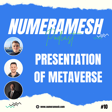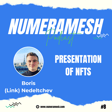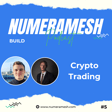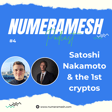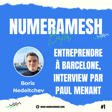Become a Creator today!Start creating today - Share your story with the world!
Start for free
00:00:00
00:00:01

#2 - Anton Golub, crypto entrepreneur since 2013 (flovtec & SwissAssetDAO)
Anton takes you on a journey through the origins, philosophy, and future of Bitcoin.
Transcript
Introduction and Background
00:00:00
Speaker
Hello, Anton. Thank you so much for joining us today for the second episode of the Numera Mesh Podcast. I'm pretty excited to be here with you today. I think that we cannot have started better. We have already worked together on the
00:00:15
Speaker
webinar that was with Finimize. I have discovered you through the Paris blockchain week summit, I think the second edition. So hello, happy to have you here. Maybe you can present yourself quickly. And how did you discover Bitcoin and the blockchain universe, please? Yeah, so thanks very much for inviting me. A pleasure to be here and looking forward to some, you know, podcasts, to some discussion. I'm sure you know it's going to be a blast.
Founding Lika and Crypto Beginnings
00:00:39
Speaker
About myself very briefly, I'm a mathematician by background. I worked in traditional finance at the big hedge fund in Switzerland as a high-frequency trader. Great experience. We were like this. Back in 2012, 2013, my boss back then at the hedge fund kept on telling me about blockchain, about Bitcoin, how it's going to change the world, especially finance.
00:01:03
Speaker
And you know in two thousand and thirteen hours at the right place at the right time and together with you know back then my boss at the hedge fund. The two of us co-founded the second ever crypto company in Switzerland.
Fluff Technologies and Swiss Asset DAO
00:01:15
Speaker
Call it camp where we build the lead digital asset exchange was amazing experience you know I was co-leading it for almost five years.
00:01:23
Speaker
It was one of the oldest and biggest crypto exchanges in Europe. So really, from 200 to 200 people, office over the world, many different verticals within the company. Peak valuation, half a billion back then. So really like awesome experience. Did an exit in 2018. And then I launched a market making company called Fluff Technologies. Usually people ask me why a market maker? It's because when you run a crypto exchange, you learn the first day how important liquidity is.
00:01:54
Speaker
And back then there was a big problem with lack of liquidity and a market maker is a company who solves that problem. So it was for me, it's like a no brainer, a big business opportunity. I was the leading Flotek as a CEO for almost five years. So market making all of your top tier exchanges for a lot of projects. I'm sure, you know, some really huge famous ones. Sure. A lot of the, you know, our listeners would know about, uh, did an exit in summer last year and now I'm running a DAO.
00:02:19
Speaker
So I'm running a DAO in Switzerland called Swiss Assa DAO or SWAT, you know, that's how we see it, where we're building a platform that enables the crypto ecosystem to invest into real world assets.
Personal Journey and Influences
00:02:34
Speaker
So we're kind of creating that bridge. So crypto companies can deploy capital into, let's say tokenized government bonds or tokenized real estate.
00:02:44
Speaker
and really amazing 10 years in the crypto industry. Couldn't be more excited for what's coming and happy that we're kind of like crypto markets are recovering and slowly it looks a lot more brighter. Yeah, that's a good timing to publish this episode. It was not my intention when I started to be honest with the podcast. I didn't know where the market was going. I would have launched in any case, but let's say that the timing is better.
00:03:11
Speaker
So to understand a little bit, maybe you and your background, so you say you start as a magician, maybe to come back a bit earlier. Where did you grow up? What kind of studies do you do?
00:03:30
Speaker
Yeah. So yeah, to answer, I mean, I'm originally Croatian. So I grew up in Croatia, you know, a beautiful small country on the Mediterranean, famous for tourism and football. That's pretty much, even though Croatia does a lot of other things, but it's pretty much famous for tourism. So if you ever went on the coast, you know, it's beautiful on the, on the seaside, you know, and the islands, or, you know, Croatia about football. So this is my experience, how people know about Croatia, you know, because of, you know, the, the football team that's been, you know, very successful on many occasions. Yeah.
00:04:00
Speaker
And, you know, I was always very good in mathematics. So really, really good in that, like naturally, you know, I didn't study a lot, but it was just always very good in math. And that kind of led me through, you know, my journey that I also pick mathematics as a kind of subject that I studied. I really loved it. It was awesome. Like really awesome. Awesome. I really enjoyed it. Had a fun, you know, doing that. I never saw it as studying math or like, you know, but really just love doing it, you know, and I studied actually theoretical mathematics or we call it pure mathematics and financial mathematics.
00:04:30
Speaker
So kind of these two things. And I was always more in love with pure mathematics than in financial mathematics. So I thought kind of doing theories and solving hard problems was kind of a lot cooler than doing practical things. But kind of the really key moment what happened for me in university was in I think it was my last year of university, kind of like in this master's bachelor master's period.
00:04:54
Speaker
was when a person from Croatia, a gentleman, came over to do a lecture. He worked in the US. He worked at a big hedge fund called Renaissance Technologies. Our listeners who know a bit about finance know that Renaissance Technologies or RENTEC is the most famous and most successful hedge fund of all time. They do automated computerized trading and they're super successful.
00:05:18
Speaker
And when that person, you know, talked about what they do, even though I didn't understand a single thing, what he was saying, you know, I was just listening in the audience, kind of paying attention and just thinking, what is this guy talking about? And it sounds awesome, you know, and I want to do that. And that's kind of where I really kind of felt that my.
00:05:33
Speaker
Passion lies more or what I want to do in the future is more on the practical side of mathematics kind of content and trading. High frequency trading and that's kind of what I was on my mind for the next couple of years, you know, but, you know, originally I really just liked solving difficult math problems, you know, this was my thing, but, you know, I still remember that day when this person who was a key person at that hedge fund for many decades.
Entrepreneurial Lessons in Crypto
00:05:56
Speaker
I talked about what he does, I fell in love with it, even though I didn't know what the hell he was talking about. So this is kind of my experience with that. Okay. And whole entrepreneurship is coming through your past because you have been in the industry for quite a long time. I remember that I had really a good time listening to you during the Paris Blockchain Week and then after and during the Finimise.
00:06:21
Speaker
event that that we co-organized whole whole blockchain and whole entrepreneurship is coming to your to your way. Yeah so I mean this whole kind of idea or passion of myself being involved in companies ventures and building them myself
00:06:39
Speaker
Actually, it comes from my father. My father was an entrepreneur. He ran a fairly big company in Croatia. Unfortunately, for people who know it, Croatia had a very difficult time around the independence.
00:06:56
Speaker
So in the nineties when the creation declared independence there was a big war that lasted for seven years and that kind of ended also my father's you know vision of building a company in Croatia because basically you know when a war starts you can't run a company anymore you know so he shut down the company actually I remembered which is a very big one you know and but he was always telling me Anton you will be the happiest when you're working on something of your own
00:07:21
Speaker
when you are working and building your own vision. And that's he just kept on telling me trusty. This is the best feeling you can have. And he kind of all he was always motivating me saying, hey, if you have the opportunity to do that, do it, you know, and it stuck in my mind for many, many years. So the first opportunity where I had kind of like,
00:07:37
Speaker
I found the right timing and opportunity in the team to create something of my own. I did it and it was the best experience ever. Highly recommended to everyone to try it, but always I immediately say it's extremely difficult to be a sustainable company. Just for everybody who's listening, don't think this is easy. This is extremely difficult. If it doesn't work out, also don't take it hard on yourself. It's just normal reality startups. But I was fairly lucky that
00:08:06
Speaker
kind of most of my ventures were highly successful. So that's kind of how I see. That's amazing. I totally agree. And especially I think in this, in this ecosystem where things are moving really fast, the prices are moving really fast. So the plan is really important and the long-term endurance, let's say it's a marathon. So to keep it
Bitcoin and Market Dynamics
00:08:27
Speaker
long-term, it's really important. And that's what we want to do with this podcast and in general with new Maramesh.
00:08:32
Speaker
Sorry Then I as you were speaking about your father I wanted to take my gun mother as an example But maybe I can take your father if you have to explain to your father I don't know if if he know maybe he knows Bitcoin a bit more if you have to explain to him What is Bitcoin and what is blockchain technology or coming back to the first time you explain? What would you what would you say to him?
00:08:58
Speaker
Yeah, so I mean, look, I have first, I will tell you an anecdote, actually, how my parents perceive crypto industry and what I'm doing there.
00:09:08
Speaker
Two years ago, during Christmas time period, I usually visit my family during holidays. There was a big report on Creation TV about cryptocurrencies. My parents were watching it, and I was with them in the room. My mom, as she was watching this, she turns to me and she says, Anton, we don't understand any of this. Do you understand it? I told them, yes, I understand it. That's what I do in my life. My parents completely don't
00:09:35
Speaker
They don't know in details what I'm doing, actually. They just know I'm doing something in this technology, finance space, but they don't really get it. But I'll tell you how my father understood what's the vision, part of the vision of the blockchain and the crypto industry is actually when I send them money. Because many times, my parents come to me and say, hey, we want to go on a holiday, we want to go to the mountains, we want to go on the coast. Please be a good son and can you send us some money so we can afford this trip or whatever they want to do.
00:10:02
Speaker
Of course, I'm a good son, so I do it. Many times, I would send them money, and literally, it would last for days. My parents, literally, just to explain it, I would tell them, write them a message saying, hey, I have sent you money. The message immediately arrives to my parents, what's up, and they say everything.
00:10:23
Speaker
And many times, my parents would immediately go to the bank and say, hey, where is the money? My son just texted us. He sent the money. So where the hell is the money? And then they would tell them, no, it takes days and a long time. And we don't know where is the money. It will come, but not now, and wait for a couple of days. And my parents always never understood it. Why is it takes so long to send money? Because they kind of say, hey, but sending money, it's all digital. It's just like sending information. So if the message
00:10:52
Speaker
that I send them comes within less than a second. Why is the money not coming within less than a second? What's going on there? I always told them, what I'm doing in the crypto industry, in the blockchain industry, we're building a platform and an infrastructure that will enable and open the world of finance to everyone and make it very efficient, very fast, very secure, and very cheap. I tell them,
00:11:17
Speaker
In the crypto industry, what we are building is a global infrastructure where when I tell you I send the money, it will arrive within a second and you will have it. That's the part that they can very much relate to because my parents, they're not stock traders. They don't do financial things or things that are very new where you could maybe understand a bit better what blockchain does.
00:11:43
Speaker
When I tell them about sending money, this example of sending money, they understand it completely. So I tell them, hey, Bitcoin, cryptocurrencies, it's a global settlement infrastructure, global platform where you can send money around the world to anyone who has a wallet and they receive it within less than a second for a very, very small fee.
00:12:02
Speaker
So that's how I explain it to them. Yeah, I think that's a good way to see it. To me, I like to see it as, as you say, as an infrastructure and the blockchain as a way to prove also the ownership because I think that's what is really interesting in the blockchain technology is that before
00:12:23
Speaker
And it's what I have explained in the first episode of the podcast, is that it was really hard to prove that you were owning something digitally, whatever it is, a picture, a money document and so on. And what the blockchain in my mind is allowing also is to
00:12:43
Speaker
to prove to someone, okay, look, I have this digital piece and the best example is the NFT. I have this, there is a limited number or no, depending on the type of the asset, but there is only one version of this digital asset
00:13:02
Speaker
And this is enabled in the case of Bitcoin through a ledger that is distributed to everyone. So if anyone of the network wants to verify, he doesn't need to trust me.
00:13:17
Speaker
He just has to go to verify that the digital asset in that case Bitcoin is mine. And if the address of the wallet is mine, then everyone that has my address can verify that I own the Bitcoin. So I think there is this concept of ownership. There is also this concept of decentralization that as you say, there is not the need anymore to ask or to wait or to rely
00:13:44
Speaker
on the bank that verify your transactions. And everyone can participate and can secure this network by buying strong computers to run massive computations. And this is how it gets verified. And then I think if I come back to my example of my grandmother, she will say, yeah, but Boris, it's too complicated. And the thing is that I think people don't have ready to understand how it works
00:14:13
Speaker
the precise details but the global idea i think we got it and then at the end you use internet but you are not able to build your modem or to or to build a full computer you buy your computer you use it and the wi-fi is coming you don't even know how to how to build the wi-fi and i think for blockchain and crypto we are in this time that
00:14:34
Speaker
before it was people like us that were understanding and were learning about how to build the system and I think that from today and from the next years it will be more people who make people using it without even knowing the exact component of these technologies.
00:14:55
Speaker
Coming back to your journey of the crypto companies, the first one that was leaked, if I'm not wrong, can you please maybe give us some details about what were the challenges?
00:15:12
Speaker
What do you think are the key components when you want to launch a project on the blockchain? And yeah, what is your first days or first months or first years in the blockchain ecosystem? Is it easy or no? How do you approach that?
00:15:33
Speaker
Yeah, so to answer that, maybe first to provide a bit of context, how was it back then in 2013 when we launched Lika? So we launched in 2013 and what happened very soon then afterwards was a very critical moment for the whole crypto industry is because back then the world's largest crypto exchange called Mt. Gox
00:16:00
Speaker
basically exploded very soon, kind of early 2014 that exploded. So it was bankrupted because something happened that was very out of the ordinary, very similar to how FTX bankrupted. And Mt. Gox as the world's largest crypto exchange back then with 90% of the volume bankrupted within a very short time period. And that meant that the coming time period was extremely difficult for us. Because if you went to anyone and started talking about blockchain, about crypto,
00:16:30
Speaker
The first two questions would be, what is this story about Mt. Gox, the biggest crypto exchange that bankrupted overnight? And what is this story about steel croat where people do transactions in illicit matters using crypto? So these are the first two questions you got in 2013, 2014. What's Mt. Gox, this exchange that bankrupted? What's the steel croat where they use Bitcoin to make payments for illicit matters?
00:16:56
Speaker
So it was a very difficult time period because it was a very negative vibe towards the crypto industry back then. And I'm making that point so people understand it, this part, but also as well that back then the industry was super small. Like literally you would have a Bitcoin meetup here in Zurich, in Switzerland, and the same 10 people would show up. So it was really, really small. It had a very negative sentiment back then towards crypto.
00:17:24
Speaker
And also, crypto industry was not an established industry, meaning that a lot of people still doubted a lot that this will ever survive, that this will ever work, especially in the context of Mt. Gox and Silk Road. So it was a very uncertain time period. But we were determined on our vision and on our goal. And we had a fairly typical startup story in a sense that
00:17:47
Speaker
We got the right team together, we got some funding, also because the markets calmed down a little bit, but also people understood that the long-term potential of the crypto technology or Bitcoin technology. We got funding and we launched a company when we started actually building quite aggressively and the whole thing took off.
00:18:09
Speaker
If I have to describe this experience, it was a lot of pain at the beginning of launching liquor due to some of the things that were out of my hands or out of our hands. It was just an industry driven sentiment. And then as we raised money and the whole thing, coffee was an amazing experience. So literally growing the people from a handful of individuals to more than 200 people.
00:18:33
Speaker
Really, Like back then was a superstar company. Literally, everybody knew about Like. So today also, this is how I know people if they had been wrong in the crypto industry, because if they know about Like. So all the people who joined 2013, 2014, 2015, they all know about Like because it was a really, I think, together with Bitcoin, Swiss, the most prominent crypto company actually in Switzerland, but in wide area. So really an amazing experience.
00:18:57
Speaker
As I mentioned, we had several verticals within the company. So it was the crypto exchange, which most people knew about. So this was kind of like the public face of liquor was the crypto exchange, but we had also corporate solutions, working with the biggest corporates and banks in the world on like technology stacks, payment infrastructure, crowdfunding and advisory and a bespoke massive management arm. So this is kind of like where you put all those people, you know, in these different verticals actually.
00:19:23
Speaker
And I have to say, like, to conclude from all of this, you know, what I really enjoyed the most was working with talented people. We had really super high quality, talented, nice, friendly people at Lika. And some of them are, you know, leaders today in the industry with their own startups and their own companies. And this is what I will cherish the most, you know, these relationships that I have built over those five years at Lika. And it was just an amazing experience, you know? So this is kind of from a high level perspective how it happened.
00:19:52
Speaker
This is really interesting and I would like to know these people and you and all of the people of that time that discovered Bitcoin, are there only let's say computer geeks or mathematicians or cryptographers and really people involved already in that kind of topic?
00:20:09
Speaker
Or there were some curious people that were also doing entrepreneurship. Because me, I discovered Bitcoin in 2017 and I didn't know much about the companies that were operating. But I'm curious
Blockchain Insights and Future Prospects
00:20:23
Speaker
to know, just to give a context to my question,
00:20:26
Speaker
to generalize and to say, is it better today to speak with people that have this experience and only speak to them, so people that knew crypto in 2013, 2014, 2015? Or is it worse also to speak to newcomers, new entrepreneurs that launched a business one or two years ago? How do you see that and how do you speak differently to people, let's say, regarding their experiences? Because I know in France, for example, there are a lot of
00:20:55
Speaker
great entrepreneurs that created another business that was not at all related to blockchain. No, they are interested in blockchain and I think it's not the same approach when you speak to that people and when you speak to a guy that has been in the industry for more than seven or eight years. Yeah. I mean, just to say is like my experience, you know, with Leakeo but also with Floftech and other companies that I found is that
00:21:24
Speaker
Most of the people who come into the crypto industry, what really brings them together is actually technology. This vision, the technology can be used to improve the lives of everyone around the world. Even though if people that I knew or worked with didn't study mathematics, for instance, or didn't study physics, or didn't study computer science, where they really have this niche,
00:21:53
Speaker
affluence towards technology. The second thing is, what I noticed is a lot of them are really passionate about making the world a better place and using decentralization to do that. I think something really common for everyone is this belief that decentralization is actually good. Not having single sources of power that can control everything, manipulate everything,
00:22:19
Speaker
do what they want at the expense of others, but really the decentralization is actually very net positive for society, for everyone in the world. So this is kind of how I would describe it, like technology and decentralization, kind of two features or anchors or people that I met that are kind of like, that I also get along very well in the crypto industry.
00:22:42
Speaker
I do want to say the NFT people are a completely different crowd. When I meet people from the NFT space, I mean, they're completely nuts. I don't know how to describe it, it's just they're in a bubble of their own, I think in the world of their own. I think also it's because part of the vibe of the NFT industry, but I think also because a lot of them are searching for their value, for their mission, and for their purpose within this crypto industry.
00:23:11
Speaker
Uh, this is just my personal opinion. I think that NFTs still kind of like are not really, or the NFT crowd that we have seen so far have not really, really have been able to demonstrate and show that they add value. I think selling JPEGs and pictures, uh, to people around the world and you know, people then gambling and speculating these JPEGs, we really don't do anything. I think it's a kind of, uh, not really the, the most. It's not really the use case that comes close to people's hearts. Yeah.
00:23:41
Speaker
And I think part of that is then the reality that a lot of these NFT people are just bit nuts. And so this is kind of how I see it actually. Hopefully I can understand the NFT crowd a lot better in the future, actually. But I think decentralization, affinity for technology, and the kind of willingness and drive to change the world is what characterizes people in the crypto industry.
00:24:05
Speaker
Yeah, I agree. I think there are a lot of projects that use NFT and they don't especially use NFT. The one that I'm really involved in, in SORA, it's the football and basketball and basketball sports and trading cars, let's say, or SORA, that is a French company that I love. But I totally agree. I think a lot of the use cases of the NFT are not really relevant or sometimes it's hard to understand the value.
00:24:34
Speaker
And speaking about that, speaking about the future, let's speak about Bitcoin. So we understood how it works a bit, so the fact that you can send money, that it is decentralized, that everyone can verify, etc.
00:24:54
Speaker
Can you say to us a little bit more about the history of Bitcoin and why it's so special and why Bitcoin is special if we compare to Ethereum or if we compare to NFT, what makes Bitcoin really special? Yeah, so just to say that when you pick up the Bitcoin white paper written by Satoshi Nakamoto,
00:25:22
Speaker
you realize actually that his vision for Bitcoin is very different than what Bitcoin is today. It's really in the first sentence of the abstract, of the summary of the white paper, where he says, a peer-to-peer global decentralized payment network. This was actually his vision, to build a global payment network where anybody can send this thing called Bitcoin to anyone else,
00:25:50
Speaker
with extremely fast, extremely cheap. And that was actually his vision. Now, when you look today, what Bitcoin is, Bitcoin today has established itself as an asset that is a store of value. So this is completely different than what he had in mind, actually, or the initial vision of Bitcoin that the community that build it had in mind. And that's now very puzzling, actually, because kind of
00:26:19
Speaker
You have one thing in mind, but what you build becomes a success because of something very different. And the reason why Bitcoin today has established itself as an asset that is a store of value is because of money printing, because of central bank monetary behaviors that's not in line and it's not the best for everyone around the world. It's because of economic instability, political instability,
00:26:46
Speaker
And this is actually the reason why today Bitcoin is kind of like an interesting, actually, asset now. So it's not like a payment industry, but it's an asset to many people around the world. And that's why the Bitcoin price is going up, because people perceive it as a part of their portfolio location, where it's an established asset that holds value. This is basically how Bitcoin started and now what it is. But now to tell you a little bit about Path, how I have seen this evolve,
00:27:15
Speaker
So back then when I joined the crypto industry in 2013, what you saw then very quickly actually that everything was a cryptocurrency. So all the coins back then that you had that were traded, and there was very few of them, they all had their own blockchain. And only after Ethereum came up, Ethereum was kind of like one of the first blockchains that
00:27:41
Speaker
created a simple and easy to use concept of tokenization, creating your own token. So before that, actually, each coin was a cryptocurrency that had its own blockchain. And then Ethereum came about that created this standard that everybody knows, ERC20, where you create a token that lives on a specific blockchain, but when you create your token, it's not a cryptocurrency that has its own blockchain.
00:28:06
Speaker
And today we talk about utility tokens, NFTs, but you have to understand when I started, the world utility token did not exist actually. You had coins, you had cryptocurrencies with their own blockchain, but there was no tokens per se. And I think that's an interesting development, like how we are moving is because people understood that blockchain can be a global settlement infrastructure where you can put any asset or any token that represents something, whatever you want. And then with that token, you can transfer
00:28:36
Speaker
value and assets and whatever you had in mind between different people around the world in a very simple way. But before that, when I started, it was just not the case actually. And the reason why I point that out is because of my initial statement of what Bitcoin is. Bitcoin today is an asset, digital asset that holds value, but it started off, or the vision was peer-to-peer decentralized payment network.
00:29:03
Speaker
which we can argue now how successful we are in delivering on the vision that we had in mind. But maybe that's just how life goes and that's the role of Bitcoin in the future.
00:29:14
Speaker
Yeah, and I think also that the thing is that even me today, I don't run my own Bitcoin also. Even me that I'm deep involved in the technical part, let's say, because I study it, but I'm not an engineer or anything like that. I'm more on the business side. I think it's not easy for a new person, even a student or a younger graduate or
00:29:41
Speaker
whatever the age even later in life to say, okay, I will spend time to set up my note. There are some companies that I wish we can have also on this podcast to explain maybe how it can be easier if you ask questions to the right people. So let's see in the future if it's something that interests the audience.
00:30:01
Speaker
and I can I let you know to to comment on this episode or to go in the website of new manage to tell us if it's something that Interest you to speak with mining mining people or yeah mining mining entrepreneurs But but yeah, I think that as you say initially Initially, let's say everyone is supposed to to run Bitcoin or then today I think that's not the case. So speaking
00:30:28
Speaker
About the value, I think you mentioned a really interesting point that people now consider that Bitcoin has a value. How do you consider that Bitcoin should be evaluated? In a context of valuation of Bitcoin, there are several methods how you can do it. For instance, one is actually the hash rate. So hash rate in plain language means just how difficult it is to mine
00:30:58
Speaker
Bitcoin is in a new block. And for instance, one way you can actually value Bitcoin is actually the breakeven costs for a miner given a particular hash rate. So hash rate means when it goes up, when the hash rate grows, that means they have more and more miners competing
00:31:15
Speaker
for those Bitcoins that are mined with each new block, actually. And then you can actually say, okay, but how much does them cost them to mine in terms of the equipment, operational costs, electricity, and so on. And then you can kind of find the breakeven costs, breakeven price or Bitcoin, such actually that the miners who mine Bitcoins are kind of like they can cover their costs of mining. So there's one way how to do it. It's very much kind of cost operational driven.
00:31:42
Speaker
And what we kind of know from crypto history is that the Bitcoin price doesn't retract closely, the breakeven price to cover the cost of mining. It overshoots downwards and upwards compared to that value. One way that's now very popular to discuss what's the fair pricing of Bitcoin is in the context of the liquidity that's coming into the crypto ecosystem.
00:32:12
Speaker
I mentioned that because it's now very topical to discuss the approval of spot Bitcoin exchange traded fund in the US. And within that context, a lot of people are anticipating or estimating how much liquidity will come into the crypto ecosystem if and when the spot Bitcoin ETF is approved.
00:32:32
Speaker
Then you can say, is it 10 billion, 20 billion, 50 billion of liquidity coming in? Then you're actually using historical data for gold, for instance, because gold also at one point had its own ETF. Then using gold as a reference, which is also a store of value, and Bitcoin being a digital store of value, you can estimate what would net mean for the price and what would that mean where the price will end up.
00:32:57
Speaker
So these are two kind of, these are not the only ones, but these are kind of like the two very different approaches that I'm kind of mentioning in the context was the fair price of Bitcoin. So why it's very much operational cost driven on the miner side. And the other one is very market driven, liquidity driven actually. Which one is correct? I don't know. I cannot tell you, but I'm more in favor of seeing it from a liquidity perspective. But that's maybe my bias because I ran a crypto exchange. I ran a market maker. I know how liquidity important is for pricing.
00:33:26
Speaker
And maybe I'm in that sense more in favor of liquidity-driven approaches towards fair pricing of Bitcoin. Maybe you have a bias. Yes, maybe. Yeah, I think that's a really good point. I want to go a little bit more in detail to explain that the hash rate of Bitcoin refers to the computing power or processing speed.
00:33:48
Speaker
of the Bitcoin network so it's a measure of how many calculations a computer or a network of computers can perform per second in order to solve the mathematical problem that I have mentioned before that validates and secures transactions on the Bitcoin blockchain and in the context of Bitcoin the hash rate is often measured in hashes per second so more commonly in kilo hashes
00:34:15
Speaker
mega hashes, giga hashes, tera hashes, or even peta hashes. And it represents thousands, millions, billions, trillions, or quadrillions of hashes per second. And the mathematical problem that miners are trying to solve is, as we mentioned already, also a cryptographic puzzle called the proof of work.
00:34:35
Speaker
we have organized with Anton it was the webinar that I mentioned before proof of work versus proof of stake we won't go into that debate today because the podcast will be two hours long but basically miners compete in proof of work to find a specific hash value that meets a certain criteria and the first one to solve it gets the right to add a new block to the blockchain and is rewarded with newly created bitcoins as well as transaction fees
00:35:04
Speaker
And there is a question also that is in the future, as Bitcoin can create a finite number of Bitcoin, will the transaction fees will be enough? But this also is another topic. So as the hash rate of the network increases, the difficulty of the puzzles, of the descriptive graphic puzzles, are just to ensure that
00:35:26
Speaker
The blocks are added to the blockchain approximately every 10 minutes and a higher hash rate generally indicates a more secure and resilient network as it becomes more challenging for any individual or any group to control the majority of the network computing power because one of the
00:35:43
Speaker
The big topic in the Bitcoin ecosystem is the attack of 51%. That is basically if you succeed to have 51% of the control of the network of Bitcoin, potentially you can attack and you can double spend the Bitcoin. And the purpose of Bitcoin is to avoid this double spending. By the way, we will publish Bitcoin Guide on Numera Mesh really soon. So maybe when you will listen to this podcast, it will be already in the blog section.
00:36:11
Speaker
So if you want to know more about how Bitcoin works and there is an excellent article that is called explaining blockchain with Pokemon cards that I also recommend in this guide. So we won't go further but it's true that let's say to summarize that the price more or less of this difficulty and that is basically if we can summarize energy so electricity
00:36:33
Speaker
Is can can be taken into account to measure the price of Bitcoin and maybe Anton Can you can you explain or reformulate a bit? What do you mean exactly by the impact or liquidity? What are the measures that you track? Where can we search for informations about that liquidity and and also? How how have you seen the evolution impacted the prices in the in the case of Bitcoin but in the case in general of crypto assets and
00:37:00
Speaker
Just to mention, there is no complete global access to the exact numbers that tell you what's the amount of liquidity that comes into the crypto ecosystem and out of the crypto ecosystem. The total global numbers don't exist. You have certain numbers that tell you part of the story. For instance, there is something called flow of funds into crypto investment products.
00:37:27
Speaker
that actually tell you how much liquidity comes into the so-called exchange traded products that are traded on the stock exchanges around the world. And then you can see how much new capital came in or how much capital actually came out of the crypto ecosystem. And for instance, I can share practical advice where you can get these data. So for instance, there is a company called CoinShares. They do amazing research and they do weekly flow of funds into those crypto investment products.
00:37:56
Speaker
And they also segregated according to different type of products. So maybe it's like a Bitcoin exchange traded product or Ethereum or so on. They also segregated geographically. Was it in Switzerland, in Germany or Canada or whatever? And also kind of segregated according to some other things. So there you can kind of see that new liquidity implies, you know, if you track and look at this data, you can see that new liquidity coming into those crypto exchange traded investment products that kind of there result in the prices increase, you know.
00:38:26
Speaker
Then the second actually point that you can kind of use to also infer kind of liquidity coming in is actually also venture funding. So you have asset managers or venture capital firms that raise capital from investors, and then they deploy that capital into the crypto ecosystem. They sometimes deploy directly by buying cryptocurrencies and tokens, or they deploy it by investing into companies, crypto companies who build products and services and infrastructure, and then the whole ecosystem grows. So this is another way.
00:38:55
Speaker
Now, it's very difficult to get information about retail participation. How is retail deploying capital? Because retail usually invests through crypto exchanges or apps of crypto companies that enable you to buy crypto very easily, but they don't really provide a data that tells you how much capital is coming in or how much capital is coming out. There is one other way you can also track new liquidity coming in, and that's the market cap of stablecoins.
00:39:25
Speaker
When you have the market cap of stablecoins increasing, meaning that stablecoin issuers like Tetra and Circle, they mint new dollar stablecoins, new USDT and USDC because they have an entity who approaches them and tells them, hey, we want to deploy 100 million into crypto and please have $100 million and please mint me $100 million of dollar stablecoins so I can go and deploy capital in the crypto ecosystem.
00:39:54
Speaker
These are the ways how you can try to infer how much liquidity is coming in. Maybe an interesting data point. In the last 10 weeks, looking at the flow of funds into crypto investment products, we see that over 1 billion of capital came into the crypto markets. Now, if people are wondering, okay, why did the prices go up? Then I can point them, yeah, it's because new liquidity was coming in and you can even see it through the flow of funds.
00:40:21
Speaker
So this is kind of like how you can infer it, but there is no total global data that you can take a look at that gives you precisely liquidity coming in and coming out. And now in terms of how the market moves, my experience is usually that Bitcoin moves first because Bitcoin is the most established cryptocurrency. It's an actually established asset.
00:40:40
Speaker
that holds value. So usually the capital first flows into Bitcoin, and then it trickles down, and then people deploy capital in the rest of the well-known cryptocurrencies like Ether, Solana, Polkadot, Definity, or ICP, and so on.
00:40:59
Speaker
And then people deploy capital into altcoins. So what I would say that is that Bitcoin goes up first, and then the rest goes up as well. And likewise, when Bitcoin crashes, then the rest crashes as well. So Bitcoin is the driver. And if you talk very specifically in finance terms, there's a lead lag correlation that Bitcoin moves first, and then the rest of the cryptocurrencies move after. So this is my experience.
00:41:25
Speaker
OK, that's really great. I agree with you. I think also coming back to the point that why is Bitcoin so special? It's because it's the crypto and the network that people have invested the most. I think let's say that it's the most decentralized. It's the number one. As you say, it's the king. It's the one that moves first. So in all of the aspects for the moment, it's the number one. Will it stay so special? I don't know.
00:41:53
Speaker
Will it stay number one? I don't know. The only point is why I say this is that because people are taking care, let's say, if I can say it like this on Bitcoin, so that's the power of it. The more people use it, the more it's decentralized, the more it's hard to
00:42:13
Speaker
to double spend and the more secure the network is if I can summarize my fault in only one sentence. Now that I think we have spoken a lot about entrepreneurship, about the definition of Bitcoin and why it's so special, the philosophy behind Bitcoin, the values that I think we all like, decentralization ownership.
00:42:39
Speaker
efficiency Etc. Etc. How do you see speaking only about Bitcoin the future of Bitcoin? I have listened a podcast recently of someone that is specializing in in lightning network Explaining that everything will go in that lightning network that lightning is better than a theorem Etc. Etc. I personally disagree with this this vision. How do you see the Bitcoin future? I
00:43:05
Speaker
So as you mentioned correctly, there is the Bitcoin future when it comes to pricing and being enough as a store of value. And there is the original vision, the payment infrastructure. Now, when it comes to Lightning Network, I have a very specific opinion that I have hands-on experience that it will not work.
00:43:25
Speaker
At leak actually, because we were building something called a semi decentralized exchange, meaning that the settlement and the swaps were happening directly on the blockchain, but the transactions were matched on a centralized server because that had to be fast. We very quickly realized that doing settlement directly on the blockchain of Bitcoin in this particular case was extremely slow and we have to find a solution.
00:43:48
Speaker
Back in 2016, we already started looking into alternatives and we ran into something that was called back then off-chain settlement, but today it's called Lightning Network. It's the same words. We stumbled upon the Lightning Network and we said, why don't we then implement Lightning Network for our exchange as a layer on top of blockchain or Bitcoin, where then we can do fast swaps, fast transactions, fast exchange of assets, and at the cheaper cost because we already saw that blockchain or Bitcoin will be extremely expensive and it will not scale.
00:44:19
Speaker
So we actually implemented one of the world's first solutions or that was actually the Lightning Network. And we found out that it doesn't work for very, very, very specific reasons that basically it just didn't work. It didn't scale as the promise was kind of given when we were looking into potential solutions, how to speed up settlement and how to scale. So what I can tell you from my hands on experience, the Lightning Network doesn't work when you want to scale.
00:44:49
Speaker
And that doesn't mean that there aren't solutions out there that might work better. I think what Ethereum is doing, or what the Ethereum ecosystem is doing with the L2 solutions. So L2 solution is like a blockchain on top of a blockchain. Maybe this is something that would work on the blockchain of Bitcoin. But the Lightning Network that's actually designed and implemented and has a vision today will not work. And I have hands-on experience
00:45:16
Speaker
confirming that. So I think we need to find a different solution. I think we have to be able to do payments and micropayments and the blockchain of Bitcoin efficiently, fast, cheap, and so on, but the Lightning Network will not deliver on that. Okay. That's super interesting. And I don't know exactly how to position myself regarding the Lightning Network, where I position myself personally.
00:45:40
Speaker
is the topic of doing NFTs on Bitcoin and developing the network in that direction. For me, it doesn't make sense when I see all the projects that are developed on Ethereum
00:45:56
Speaker
and especially I'm speaking again about Sohar that is doing an amazing job, stackware, stacknet, and so on that you mentioned, the ZK, rollups, etc. It's a topic that I want to dive in. I have just been to one conference and it was way too much mathematical for me. But yeah, let's see, I can be wrong.
00:46:19
Speaker
For today, what I see is that projects and technical people that I follow are building on, as you say, layer 2 and that's the last topic, let's say, or the last trends with layer 2 and etc. Can you please define quickly what is the blockchain? For me, blockchain is a global settlement infrastructure.
00:46:48
Speaker
through which you can exchange any asset with anyone you want in a safe and secure way through something called an atomic swap. Atomic swap means that you get, if you and I do an exchange of assets, that you get my asset at the same time I get your asset. Very important, blockchain can also serve as a global computer through smart contracts.
00:47:14
Speaker
because you can deploy simple processes that get executed in an automated way, in a decentralized way as well. And with the click of a button, this process can be executed and you can then complete a series of steps actually. So for me, blockchain at the same time is a decentralized global settlement infrastructure, but a decentralized global computer as well.
00:47:37
Speaker
I want to complete that by saying that it's totally ideal for me. Blockchain is a decentralized and distributed digital ledger that is recording transactions across a network of computers in a secure and transparent manner. So the best example that we have mentioned is Bitcoin.
00:47:59
Speaker
So it consists of a chain of blocks that's why it's called a blockchain and each block is containing a list of transactions and the blockchain is designed to be temporal resistant so that means that it provides trustworthy and verifiable record of transactions and as Anton said the key components and characteristics of a blockchain are decentralizations
00:48:24
Speaker
the fact that the transactions are grouped together into blocks and each block contains a unique identifier there is a consensus mechanism also we won't have time to develop too much on that but basically everyone needs to be aligned let's say with the version of the ledger you cannot change so it's immutable immutability is one of the characteristics it's transparent it's secure and as you mentioned also Anton that I think it's the
00:48:50
Speaker
at one of the most interesting points that you can develop smart contracts or blockchain implementation that execute alone, self-execute smart contracts with the terms of agreement directly written into code. So you don't need to think, let's say, smart contracts automatically execute and
00:49:10
Speaker
and enforce the terms of the contracts when predefined conditions that are met. So blockchain technology is a big topic. We will speak about that in this podcast. What do you think are the main use cases or the use cases that interest you the most? Of course, there is market making and all the business that you have been involved in already. But let's say, except to these businesses, what are the use cases that you follow in the blockchain industry and that you like
00:49:42
Speaker
Three use cases that I'm very interested. First one is real world assets. How can we bring real world asset investment opportunities on the blockchain and enable people from around the world to invest into those attractive and interesting and great investment opportunities? As an example, how can a person from Asia, from Africa, from Europe, invest $10 into a real estate investment project that offers a good yield of 10%?
00:50:03
Speaker
Yeah, so
00:50:12
Speaker
So this is kind of like something that it's very exciting for me that I think is very interesting. Second topic is DAOS, so decentralized autonomous organizations. How can we use decentralized blockchain technology to govern entities in a very, very new way? And how can we engage communities with those entities and benefit and support the communities who engage in such activities?
00:50:40
Speaker
So that was extremely interesting for me. And finally, decentralized social networks. So today we're highly aware how powerful all those social media platforms like Facebook, X, Twitter, Instagram, LinkedIn, Snapchat, you name it, we are highly aware how powerful they are and how much control they have and how much they abuse it on many occasions. And having decentralized solution.
00:51:05
Speaker
for a social network with something that I think sounds very beautiful, something that people can very much relate to and something that they are very interested in. Okay, maybe you can give us a hint about what you are doing with your DAO, that is Swiss Asset DAO, if I'm not mistaken. Yeah, so Swiss Asset DAO, we combine two of the very two important narratives and trends that are very close to me.
00:51:33
Speaker
Swiss Asset DAO is a DAO by itself. It means we have members and community that govern the DAO and direct in which way Swiss Asset DAO will go forward, and they contribute to Swiss Asset DAO. Swiss Asset DAO's vision and mission is to build a platform that serve as a bridge to bring real-world asset investment opportunities to the crypto ecosystem.
00:51:58
Speaker
For instance, what we want to build with this platform is that another DAO, somewhere around the world, who has some capital in the treasury and wants to deploy that capital, turn a good return, earn a good yield, a sustainable yield, that we enable them to invest, for instance, into government bonds, and that they get a return or a yield of 6%, 7% per year on their capital, and then they can use it in a very sustainable and good way.
00:52:27
Speaker
creating that bridge between real world and the crypto world and enabling the crypto system to invest into real world assets. Yeah, there is a light paper that I recommend to check that has been updated, I think in October, that explain how they are and lending protocols have ventured
00:52:52
Speaker
and the concept of the proposed solution, the bridge, as you say, between the reward asset and all the legal and financial aspects. I think it's a resource that is important to understand and to follow, as I'm following you since a lot of time, also to follow Anton on the social network.
00:53:15
Speaker
Anton, why do you think blockchain is a special industry and what do you think are the singularities and the tips that you can give to someone that wants to launch a business in this industry?
00:53:29
Speaker
I mean, first, you know, launching a business in general, it's extremely difficult. So just to say like that, you know, and whatever startup or a company you decide to create, you know, it's going to be, you know, challenging is going to be very exciting, but very challenging and very demanding. But it's going to be extremely rewarding, you know, and I really highly advise everyone to really get involved, to build, to create, because you're going to really enjoy it and have a great time with it. But you know, to prepare, there's going to be a lot of hard work for quite some time.
00:53:59
Speaker
And I mean, the one specific advice that I can give when it comes to building businesses in crypto industry and what makes crypto industry so special, that in the end, it's all about the people. So when you are looking to create your business,
00:54:15
Speaker
You know, when you're looking to, when you have a certain vision, understand you need to do it with other people. You cannot do it alone. So you need a lot of help. You need to have people that are on board and aligned with your vision and your mission and what you want to do. And be very careful and smart and wise how you choose those people, but you need to surround yourself with great people if you want to succeed. You know, so this is my small advice, you know, but the most important advice you can get from me.
00:54:42
Speaker
that, you know, what you will learn and what I have seen that it's all about the people. So choose your people wisely, choose the best people, the ones that align with you, your values, your mission and vision. And once you have the right people, everything will be amazing and very simple to do. So my, you know, two cents on that one.
00:55:01
Speaker
Okay, perfect and regarding last question maybe about your crypto trading experience, how was your experience with crypto and what is next for you regarding crypto or in general in your businesses?
00:55:19
Speaker
Yeah. So, I mean, when it comes to crypto trading, you know, I want to point out that I don't do trading on a day to day basis. I just don't trade, you know, even though I was a trader and I was a happy visit trader and I ran a market making company, I don't do trading day to day. So what I do is I usually, if I like something or I like a project or a cryptocurrency or a coin or a token, I deploy some capital in it, but I leave it for the long term. So I don't, you know, do trading day to day.
00:55:48
Speaker
but I do longer term investments. And the reason why I don't do trading is actually because as a retail trader, or even for me, you can say I'm a professional trader, the odds are really not in your favor, because you have professional trading firms, you have proprietary trading firms, hedge funds, market makers,
00:56:08
Speaker
All of these people, their whole goal in life is to be the best trader possible. And really, you cannot compete easily with them. And I cannot compete easily with them if I go around on an app and start trading and buying and selling a lot. So really, what I want to say is that my experience is that the odds are not in your favor. If you do short-term trading, it's better to focus on something long-term, find something you understand, find something you like, and find something where you see the potential.
00:56:38
Speaker
And, you know, stick with that. And kind of where do I see the crypto industry going forward? I mean, I think we're, first of all, I want to say that we're still super early on in the crypto industry, like super, super early on. And, you know, just in the beginnings, this is going to be a long race, a long marathon. And I couldn't be more excited being part of the crypto industry. And my focus at the moment is on Swiss as a Dow, building that, growing that and, you know, learning what's happening in the crypto industry, always something new.
00:57:07
Speaker
And I'm just really excited to be a part of it. OK, amazing. Anton, thank you so much for your time. It has been an amazing pleasure. And yeah, I think we will keep posted and follow you, especially on LinkedIn. That's what I'm particularly doing. And Swiss asset now everywhere.
00:57:29
Speaker
The website is swissassetdao.org, if I'm not mistaken. And the resources will be somewhere in the description of this podcast. Thank you so much for your time. And yeah, maybe I see you're wrong in another Paris Blockchain Week or another event.
00:57:51
Speaker
Absolutely. Thank you very much, my friend. It was a pleasure. Feel free to contact me if you have any questions or LinkedIn or Twitter or anywhere or through the website. And, you know, I hope we see each other and I'm sure we will see each other very soon. Thank you very much, my friend. Okay. Thank you. Bye bye, Anton. Bye bye. Thank you.

